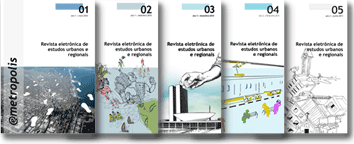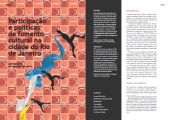-
Tweets
Participación Ciudadana y Espacio Popular Urbano en Medellín
Por Omar Alonso Urán A.
RESUMO
Mudanças recentes na administração pública e planejamento urbano em Medellín (Colômbia) são frequentemente apresentadas como um todo indiferenciado, onde o governo municipal toma a iniciativa e a população local acompanha tudo passivamente. A questão fundamental é que, apesar da dinâmica geral da cidade de Medellín, cada comuna (divisão político-administrativa da cidade) tem sua própria lógica e seu modo de articular as ações e políticas municipais. Este é, por exemplo, o caso da Comuna 1, no qual podemos ver através dos espaços abertos por programas municipais, como o de Planejamento e Orçamento Participativo e o de Projetos Urbanos Integrais – PUI, a expressão de um tipo de cidadania insurgente que, a partir de uma dialética de cooperação e de conflito com o Governo Municipal, tem sido capaz de propor um Plano de Desenvolvimento Local que inclui linhas de desenvolvimento urbano e habitação para os moradores do município. Caso ligeiramente diferente é o da Comuna 13, onde apesar do urbanismo social e de registrar os maiores investimentos da Prefeitura de Medellín nos últimos oito anos, os níveis de violência parecem relutantes em baixar, escondendo no fundo práticas ilegais e vícios políticos que atuam contra as organizações comunitárias e o próprio Estado nas disputas pelo controle territorial. Assim, este artigo trata de destacar que um projeto urbano, mesmo que seja social e/ou participativo, precisa reconhecer politicamente a população local, suas diferenças e seus espaços, do contrário será apenas mais uma obra vazia que não chega a desenvolver a institucionalidade e menos, ainda, a cultura democrática local.
Palavras-chave: Medellin; Planejamento; Cidadania insurgente; Política; Urbanismo social.
ABSTRACT
Recent changes in public management and urban planning in Medellin (Colombia) are presented most of the time as an undifferentiated whole, where the municipal government has taken the initiative and the local population goes behind him. The fact is that, despite the general dynamic of the city, each Comuna (political-administrative division of the city) has its own logic and way of engage the actions and municipal policies. This is the Comuna 1 case, where we can see, through municipal programs as the Participative Planning and Budgeting and Integrated Urban Projects (PUI), the expression of a kind of insurgent citizenship, who, by means of a dialectic of cooperation and conflict with the municipal government, has been able to build a Local Development Plan, which propose guidelines of urbanism and popular housing for the commune inhabitants. Slightly different is the Comuna 13 case, a complex scenario where despite of the social urbanism and having the biggest social investments in the municipality in the last 8 years, the levels of violence are been reluctant to fall, hiding in the background illegal and politicking practices fighting against the local state and grassroots organization for the territorial control. It shows how an urban project, social or participative, if does not politically recognize the local population, their differences and their spaces, will only be one more physical piece that does not develop the institutionality and democratic local culture.
Keywords: Medellin; Planning; Citizen insurgency; Social urbanism.



